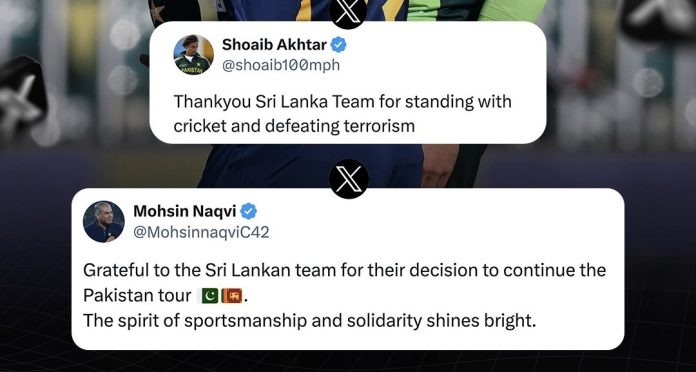Pakistan’s government and cricket board have extended their profound gratitude to the Sri Lankan cricket team for its decision to continue with its ongoing tour, following a deadly suicide bombing in the capital that briefly placed the series in jeopardy.
The Pakistan Cricket Board (PCB) Chairman, Mohsin Naqvi, who also serves as the Federal Interior Minister, publicly praised the visiting team’s resolve.
“Grateful to the Sri Lankan team for their decision to continue the Pakistan tour,” Naqvi stated in a message posted on the social media platform X. “The spirit of sportsmanship and solidarity shines bright.” This sentiment was echoed widely across Pakistani media, which has largely focused on the official expressions of gratitude and the strong diplomatic ties affirmed by the decision.
The commendation comes after a tense 24 hours for the tour. On Tuesday, a suicide attack outside a court complex in Islamabad killed 12 people, just hours before Pakistan and Sri Lanka were set to play their first One-Day International (ODI) in the nearby city of Rawalpindi.
Following the attack, reports confirmed that several Sri Lankan players had expressed grave safety concerns to their management and requested to return home.
However, Sri Lanka Cricket (SLC) intervened decisively. The board issued a formal directive instructing all players, support staff, and team management to remain in Pakistan and complete the tour, which includes two more ODIs and a T20I Tri-Nation series. SLC warned that any player or staff member who leaves against this directive will face a “formal review” of their actions.
In response to the players’ valid concerns, Pakistani authorities have implemented a significant security upgrade. PCB Chairman Naqvi personally met with the Sri Lankan squad at their hotel on Wednesday evening to provide “foolproof” security assurances, reiterating that the team is being afforded state-guest status. Security for the team is reportedly now being overseen by the Pakistan Army and paramilitary Rangers.
Naqvi also held a high-level meeting with Sri Lanka’s High Commissioner to Pakistan, who, after a detailed briefing, expressed “full satisfaction” with the enhanced security protocols.
While the response from Pakistani officialdom was swift and public, the Pakistan national cricket team players themselves have not made public comments on the situation. The diplomatic and security assurances have been handled at the highest levels, with Pakistan’s Information Minister, Attaullah Tarar, also issuing a statement honouring the Sri Lankan team’s presence.
As a result of the logistical and security adjustments, the PCB, in consultation with SLC, has rescheduled the remaining two ODI matches. The games, both set to be played in Rawalpindi, will now take place on Friday, 14 November, and Sunday, November 16.
The situation is acutely sensitive given the history between the two nations. In 2009, the Sri Lankan team was the target of a terrorist attack in Lahore, an event that halted international cricket in Pakistan for nearly a decade. Sri Lanka’s decision to continue the current tour is being viewed in Pakistan as a monumental gesture of trust and a crucial step in cementing the nation’s status as a safe host for international sports.
In 1996, Australia and West Indies had refused to play their matches in Sri Lanka during the ODI World Cup that was joint-hosted by India, Pakistan and Sri Lanka. The move had come at a time when Colombo Central Bank was bombed by the Liberation Tigers of Tamil Eelam (LTTE) in January that year and resulted in 91 dead and 1400 injured. To counter the safety concerns raised, Sri Lanka, like Pakistan, offered maximum security to the teams.




